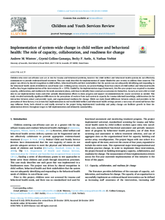Abstract
Children who enter out-of-home care are at risk for trauma and behavioral problems, however the child welfare and behavioral health systems do not effectively communicate to provide evidenced-based treatment. This case study describes the implementation of [name blinded for peer review] to address these concerns. The project was driven by shared recognition in child welfare, behavioral health and their stakeholders that the system was not adequately identifying and responding to the behavioral health needs of children in out-of-home care. Utilizing survey research, we present findings from four cohorts of child welfare and behavioral health staff as they began implementation of the intervention (N=1370). Guided by the implementation stages framework, this five-year project was required to examine capacity, collaboration, and readiness in the needs assessment phase, and chose to identify these constructs as outcomes in themselves. As such, we were able to trend data in our implementation teams and other periodic dissemination efforts to show progress and support recommendations for course correction as needed. This study revealed statistically significant differences in the perceptions of workers from each system in capacity for trauma-informed knowledge, collaboration (in the interaction between cohort and provider type), and organizational readiness for change. While our study found differences between cohorts and providers in the perception of these factors, it is certain that implementation in real world child welfare and behavioral health settings present a vast array of contextual factors that may influence them, both related to and totally external to the project being implemented. Leadership and policy change can facilitate growth in these implementation drivers throughout stages to full implementation and ultimately sustainability.
View article here.

